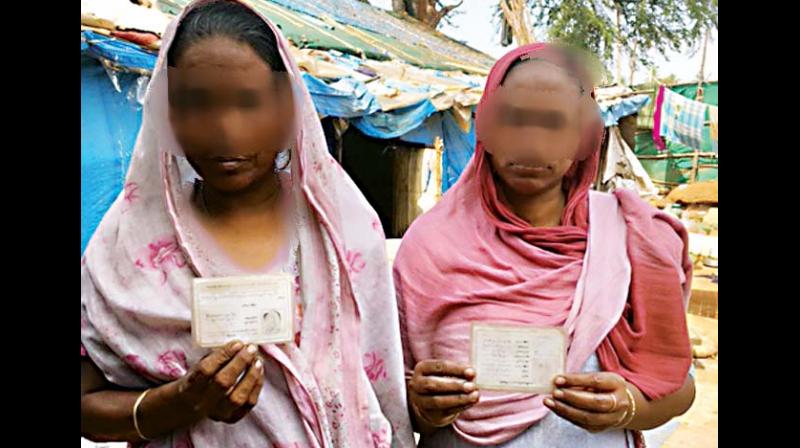Bengaluru: 38 Rohingyas make city their home
UN High Commission for Refugees card saves them from harassment.

Bengaluru: The early man made his settlement near a river for his survival. The hounded man today makes his refuge near a water body because water is a necessity even if shelter is not.
Weaved within the layers of a rich cultural subtext of Bengaluru is a strange narrative of people, who are on the run from law and history of persecution in their country and have found refuge near a shrinking lake in the tech hub of India. This correspondent met a tiny settlement of 12 families of Rohingya Muslims in north Bengaluru, who earn their livelihood picking rags and scrap.
They carry the United Nations High Commission for Refugees (UNHCR) card, which was issued to them in New Delhi, and on the basis of which, they escape arrest and have been allowed to pitch in their tents on an open piece of rented land.
The monthly rent has increased since 2012, from Rs 5,000 to Rs 11,000 and so has the 'protection' money from the police and the neighbouring Bangladeshis, who are better off than the wretched boat people because they manage to pass off as Bengalis from West Bengal.
There are 38 Rohingyas, who call themselves "Burma waley log" (people from Burma, now Mynamar) and feed themselves by selling scrap, destitute shoes and household items, which they pick from the city's garbage. They live in close proximity with a colony of alleged Bangladeshis, who have managed to merge with the local population as Bengalis from West Bengal. The Rohingyas stand out as aliens among hundreds of other illegal foreigners in the city, because they speak a different language and are considered as pariahs among the lot.
Mastabis is 50 years old and he heads the group of Rohingyas, who had fled Buthidaung in Rakhine state in Mynamar in 2012, swam across the Naf River in the middle of the night to cross over to Bangladesh, where they spent their life savings paying bribes to people on either sides of the porous international border to cross over to India.
"We managed to reach Agartala from where we boarded a train. We didn't have money to buy tickets. We told the ticket collector that we are from Burma and he took pity on us. Some fellow passengers gave us food. On reaching Kolkata, our agents demanded money to protect us from being caught by the local police. We gave them the leftover money but many of our people, including young girls and boys, were arrested and lodged in Dum Dum jail. In Kolkata, we were asked to go to Hyderabad, where many Rohingyas have been given shelter and protection. Even now, hundreds of Rohingyas are fleeing from Jammu and coming to Hyderabad. We couldn't stay there because there is no space," said Mastabis.
His wife Gul Bahar dusted two broken plastic chairs, which were blackened by dirt and soot and asked us to sit outside the tenements.
There were more women and infants than men. "Children have gone to a nearby government school and men are at work," said Lal Moti, the eldest woman in the group as she flaunted her UNHCR application form for the camera. Some women have their husbands and children behind bars in Kolkata, including Mastabis's 22-year-old-daughter Musalmeena.
"My three sons and husband are in jail in Kolkata," said Noorbano.
The group fished out some gory photographs of Rohingyas being persecuted in Myanamar and said that these were sent to them by their relatives on their mobile phones. "We were small farmers but they (the Mynamar police and army) burnt our farms, took away all our belongings and beat us up. We had to run for our lives," said Mastabis.
The group gets caught in frequent brawls and fights over scrap from other garbage collectors. The men go for prayers to the nearby mosque.
There are four women, pregnant with unborn Rohingyas, who will be delivered inside the tenements by the other women in the group, who have suffered the same agony in the past.
The uneven mud road to the Rohingya tenement smells of human faeces and waste. A little ahead on the roadside is a blossoming nursery of winter flowers and red petunias.

